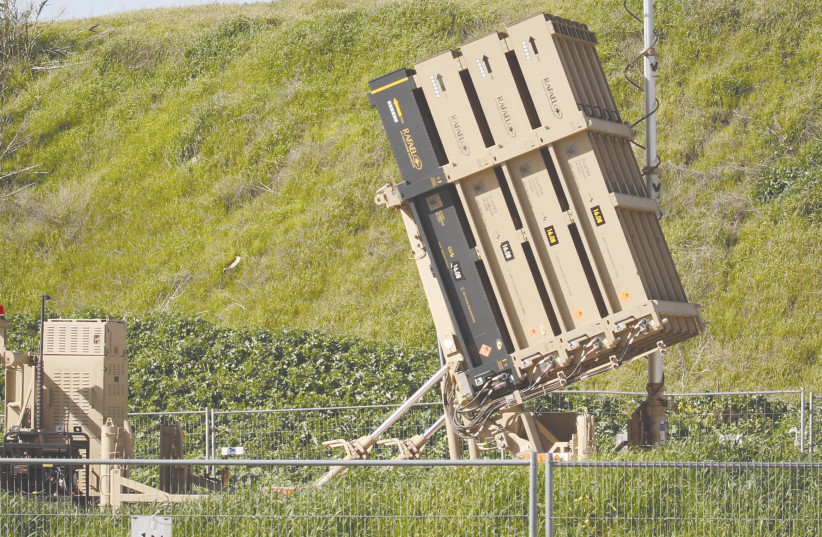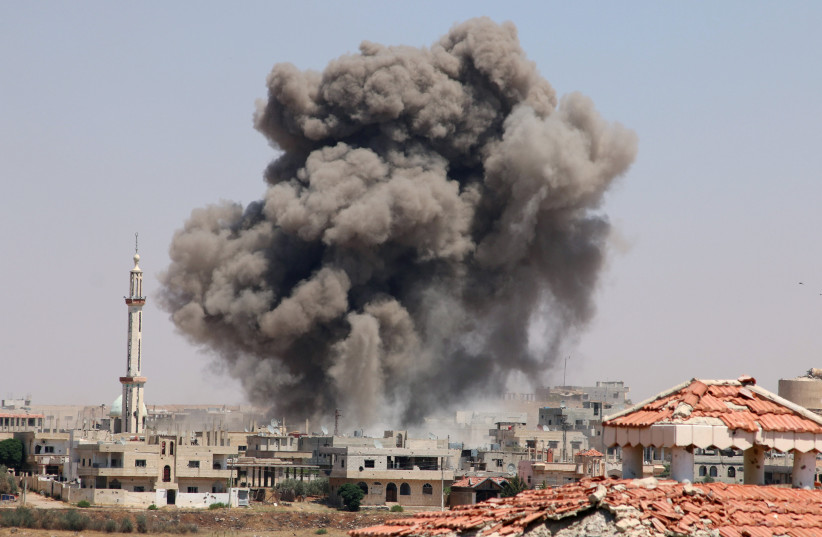Israel has undertaken a major military effort against what it sees as an increased Iranian threat in Syrian territory.

The quiet on Israel’s border with Syria is deceiving. Under the surface, and often away from the headlines, Israel has undertaken a major military effort against what it sees as an increased Iranian threat in Syrian territory.
An enemy since the establishment of the Jewish state, Syria has evolved to become the host of a major threat to Israel. Israel once saw the Syrian army as a formidable enemy that possessed non-conventional weapons. While this is no longer the case; the threat has been replaced and the response has been altered accordingly.
The civil war in Syria, which erupted as part of the Arab Spring in 2011, severely weakened the regime and the army of President Bashar Assad. At first, Israel debated its position. The dilemma was whether to help Assad’s opposition topple a regime hostile to Israel or to be an uninvolved bystander. The latter option was chosen, while simultaneously providing humanitarian aid on the border, mostly behind the scenes.
Minor incidents
Over the years, there were occasional incidents of stray fire penetrating Israeli territory. Israel’s policy has been to respond to every fire toward the northern part of the country, whether intentional or not, asserting a breach of sovereignty.

Assad in turn would condemn Israel, but given his unstable position, it was a well-rehearsed show by all participants that never escalated further.
Iran has been a major provider of support to Assad, seeing the stability of his regime as a major interest that needs to be defended. For Israel, this was a growing cause of concern.
Russia gets involved
Things became complicated in 2015 when Russia became directly involved in the civil war by inserting its forces into Syria, after several years of passive assistance. Thanks to Russian reinforcements, the turning point was quick to come. In 2016, when Assad managed to reestablish his hold on Syria’s second-largest city, Aleppo, the balance was tipped. Syria transformed into an arena where major geopolitical interests clash and coexist at the same time.
Israel needed to change its strategy. The decision was to undertake a “campaign between wars” aimed at curtailing the Iranian presence in Syria. The assessment in Israel is that Assad himself will not retaliate against Israel due to a range of domestic and regional interests. Limiting himself to weak condemnations, he has not contradicted Israel’s forecast.
As part of this campaign, Israel is believed to have carried out hundreds of strikes in Syria against militant groups, mainly against the Lebanese-based, Iranian-backed Hezbollah. Hezbollah uses Syrian soil to transport weapons to be used in future attacks on Israel. Israel has taken responsibility for only a handful of strikes against Iranian military installations in Syria and weapons convoys.
Last month, Israel is believed to have carried out an airstrike against Syria’s international airport in Damascus, causing extensive damage and shutting it down for weeks. Russia was quick to condemn the attack.
Experts consider Hezbollah to be Israel’s most immediate and dangerous threat, in possession of thousands of precise missiles.
“Israel’s strategic decision is to prevent Hezbollah from obtaining tie-breaking weapons or abilities,” said Dr. Yehuda (Udi) Blanga from Bar-Ilan University’s Department of Middle Eastern Studies.
“In recent years, another goal has been added by Israel,” said Dr. Carmit Valensi, the head of Syria research program at the Institute for National Security Studies, Tel Aviv University. “In light of all the challenges Assad is facing within Syria, there is an opportunity to drive a wedge between Damascus and Tehran.
“Israel believes that Iran has become a liability rather than an asset to the Assad regime and its stability,” Valensi added. “Israel is looking to accentuate the gaps between Iran and Syria.” This effort has so far found limited success. Assad has tried to curb Iranian movement in Syria, but the Iranians are not being cooperative.
Syria’s alignment with Shi’ite Iran puts it at odds with many Arab countries, including Gulf states. Assad, who needs assistance from these countries to rehabilitate his war-torn country, needs to make a decision.
“The Iranian plan to establish a strong presence in Syria has definitely been obstructed,” said Valensi. She attributes this not only to the ongoing Israeli campaign but also to the US’s assassination in Baghdad of Iranian General Qasem Soleimani, who was a leading figure in Iran’s involvement in Syria.
Soleimani’s demise served as a major dent in Iranian plans to establish its closest point of friction with Israel. Yet Hezbollah is still a threat that continues to increase its arsenal and improve the quality of its missiles.
“Israel has established a status quo that it has succeeded in maintaining,” said Blanga. “It has managed to prevent Hezbollah from operating from Syria, but it has not always succeeded in preventing Hezbollah’s armament.”
Syrian Civil War
The Syrian Civil War is part of a major change that the Middle East has been going through. Syria has become an arena in which this process can be visibly identified and where the changes in alignment are vividly demonstrated.
Later this week, Russian President Vladimir Putin is headed to Tehran where he will discuss developments in Syria. Turkish President Recep Tayyip Erdoğan will also be present, adding to the complexities.
Putin is not at peace with the Iranian presence in Syria.
“Israel needs to invest more in dialogue with Russia,” said Blanga. “The fact that Russia and Iran do not see eye-to-eye on Syria’s future is an advantage Israel should use. Israel needs to strengthen the dialogue with Russia in order to guarantee its freedom to act in Syria … but also maybe the Russians can convince Assad to curtail the Iranian presence in the country.”
“Russia wants to see Syria stabilized and rehabilitated,” said Valensi. “Iran has a destabilizing effect in Syria and they both are competing for influence and control over the country. Israeli strikes against Iranian targets serve Russian interests as well.”
In recent years, as Israel and several Arab states have normalized ties, Iran has emerged as a common enemy and Israel as its main active opponent.
“Israel is perceived as the only actor who is operating against Iranian presence in the region,” said Valensi.
“The US is hardly responding. This has positioned Israel as an actor with precise abilities and much-needed courage.”
Dr. Carmit Valensi
Israel is still far from reaching its goal and the existence of the Iranian presence in Syria is not threatened.
This guarantees not only the continuation of Israeli operations in Syria but also the continuation of tensions in the region that could spiral into a greater conflict at any time.
Content retrieved from: https://www.jpost.com/middle-east/iran-news/article-712578.